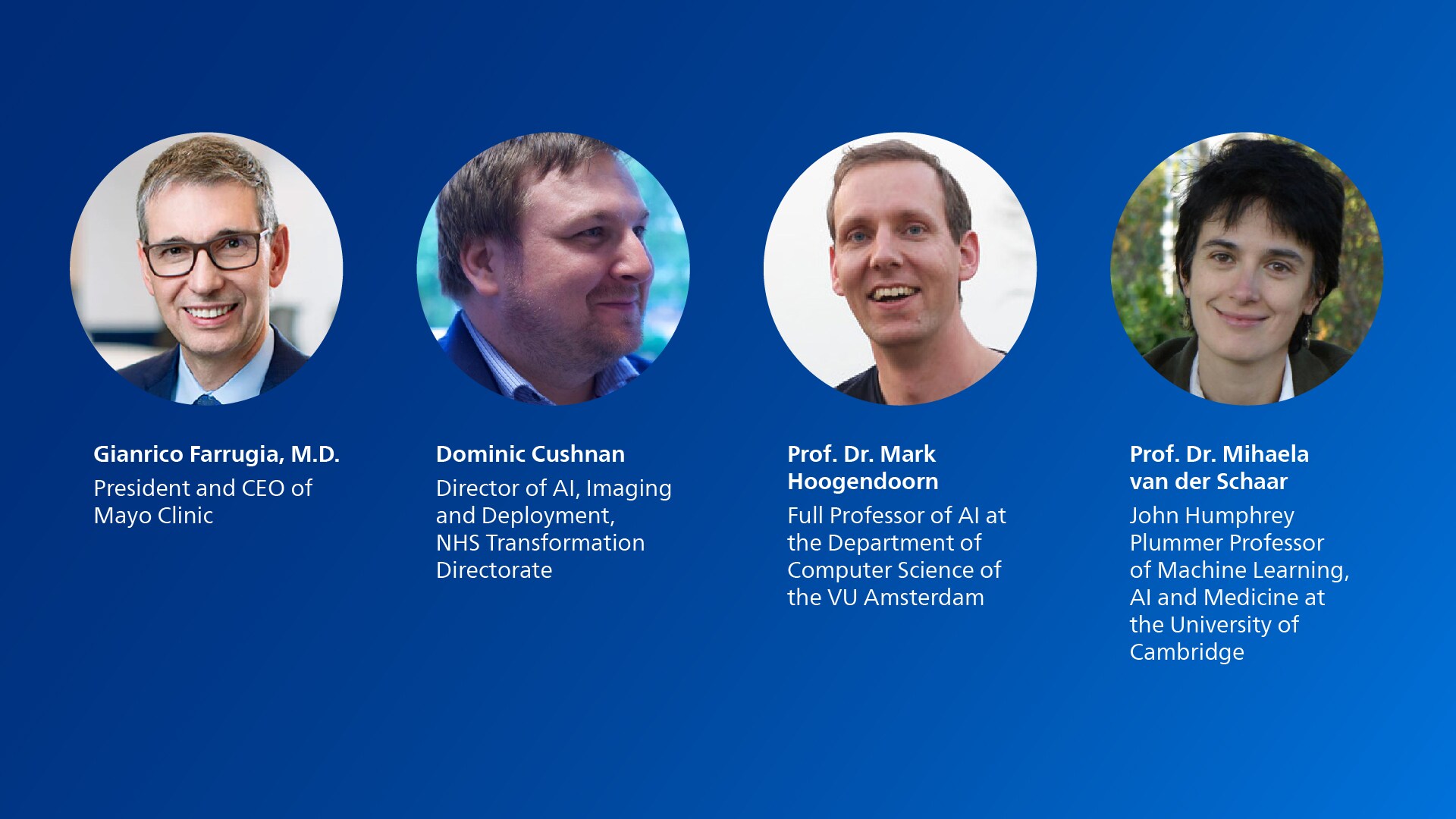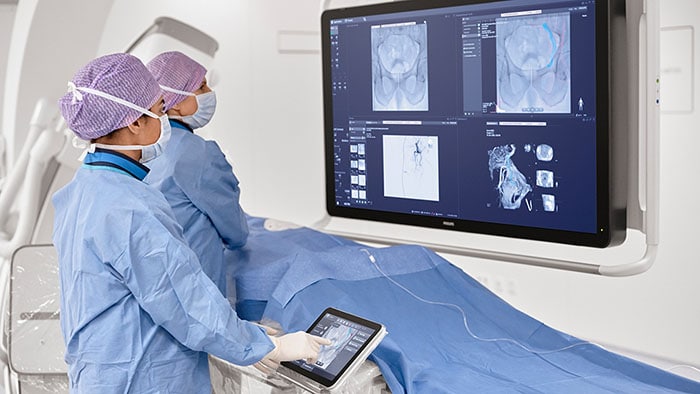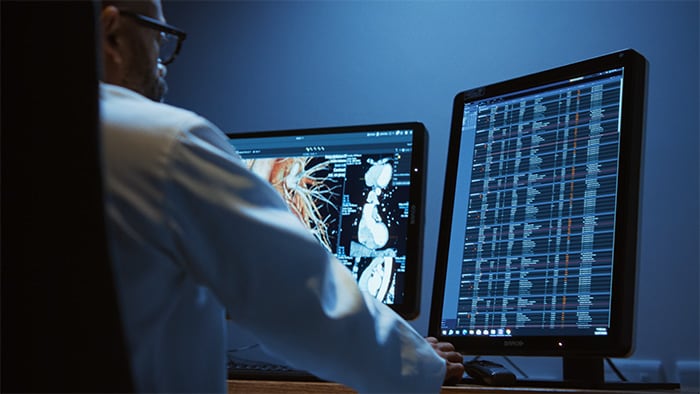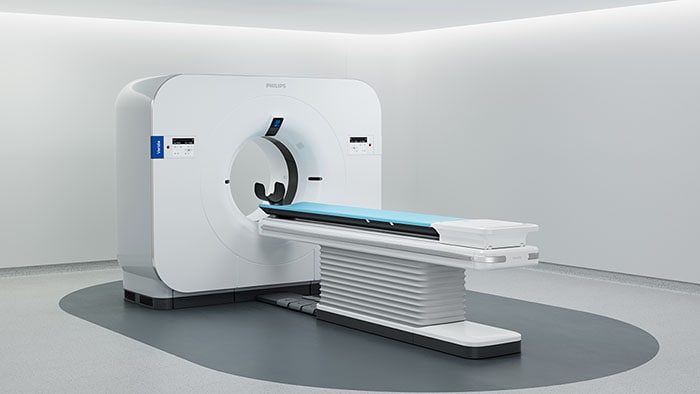The future of AI in healthcare according to four leading experts
Oct 06, 2022 | 7 minute read
Artificial intelligence (AI) in healthcare has spurred a wealth of research and innovation in recent years, but barriers to clinical adoption remain. How can we unlock the full potential of AI to improve patient outcomes and make healthcare more accessible, equitable, and affordable worldwide? Four leading experts – representing the cutting edge of AI innovation in clinical practice, government, and academia – share their perspectives.

To deliver the full benefits of AI to healthcare, we must move from pipeline to platform thinking
For emerging technologies like AI to have maximum impact in healthcare, we need to fundamentally rethink how we innovate, says Gianrico Farrugia, President and CEO of Mayo Clinic – one of the largest health systems in the US serving more than 1.4 million patients each year. “The traditional pipeline model relies on a linear series of points, from coming up with new ideas to turning them into stand-alone products which providers and patients then get to use. Instead, a platform approach relies on an ongoing ecosystem of collaboration. We need to bring together providers, medical device companies, health tech startups, patients, and payers to co-create integrated solutions through digital platforms – based on longitudinal patient data and algorithms that continue to learn over time.”
“We all know the challenges facing the healthcare industry, ranging from patients seeking care in ever-higher numbers to uneven access and quality of care. But it has been very difficult to successfully address those challenges relying on legacy models.”
What is needed in AI and healthcare innovation in general is a move away from pipeline thinking towards platform thinking, Dr. Farrugia argues.
Mayo Clinic is taking a lead role in this transformation through the Mayo Clinic Platform, a cloud-based digital platform that is specifically designed for healthcare. According to Dr. Farrugia, for any such platform to be adopted at scale, it needs to safeguard patient data privacy and security while enabling innovation through broad access to patient data and AI models. “A digital platform in healthcare needs to be highly trustworthy and scalable at the same time. That’s why we’re using a federated data infrastructure. Rather than sending data to AI models, we are bringing the AI models to the de-identified data, creating a ‘glass wall’ that gives external collaborators access to results without the data ever leaving the platform.”
The Mayo Clinic Platform has already spawned a slew of promising AI innovations, including an ECG-based algorithm that can help detect early-stage heart disease when it’s still most treatable.
Algorithms need to be validated against representative real-world datasets
Another firm believer in co-creation is Dominic Cushnan, who is collaborating with healthcare providers, academia, and health technology companies in his role as Director of AI, Imaging and Deployment at the NHS Transformation Directorate, a body driving the digital transformation of the British National Health Service (NHS). The NHS AI Lab led by Cushnan aims to take away barriers to developing and deploying AI solutions in health and care, as well as demonstrate their real-world impact on healthcare professionals and the general public.
One such barrier to wider adoption of AI algorithms is the need for large and representative data sets to validate them. “Only through robust testing can we ensure that algorithms work well for the population at hand, and thereby build trustworthiness and confidence in the technology,” says Cushnan.
But real-world data can be hard to obtain. That’s one of the reasons why, during the height of the COVID-19 pandemic, the NHS AI Lab worked together with Philips and many others to set up a National COVID-19 Chest Imaging Database, supporting researchers across England in their quest to understand the virus and to develop AI technologies that enable the best care for patients hospitalized with a severe infection.
“Having such a large aggregate dataset allows us to test for potential overfitting of AI algorithms, while the dataset itself remains closed off to developers at all times”, Cushnan explains. “One thing we have learned through our testing is that different populations, including ethnic minorities, may have clinical specificities that lead an algorithm to underperform for certain patients. This shows how important it is to validate algorithms against a real-world dataset that is representative of the target population.”
Following the success of the National COVID-19 Chest Imaging Database, which is now also helping to study long COVID, the NHS AI Lab is looking at ways to evaluate and deploy more AI imaging technologies to support diagnostics.
Healthcare presents unique challenges that require tailored AI methods
While having the right platform and data infrastructures will go a long way towards promoting wider adoption of AI in healthcare, more is needed to bridge the gap between academic research and real-world application, says Mark Hoogendoorn, professor of AI at the VU Amsterdam.
“Healthcare presents unique challenges that require AI methods like machine learning to be better tailored to the medical domain. Data on specific diseases or patient groups may be limited. And what’s especially important to recognize about healthcare is that decision-making often involves highly sequential problems, where people need to take multiple decisions in a row, with the outcome of one decision affecting the next. For example, a doctor may decide on a certain treatment, say medication, which then affects the course of the patient’s disease, after which the doctor needs to take further decisions based on the unique disease trajectory of that patient.”
To support such sequential decision-making with AI, Dr. Hoogendoorn is among the first to pioneer the use of reinforcement learning in healthcare – which is a type of machine learning that learns from the outcomes of each action in a sequence to optimize for a given end goal. In a healthcare setting, a positive outcome may be a patient recovering or being discharged from the intensive care unit (ICU).
With the use of reinforcement learning, Dr. Hoogendoorn and his collaborators are tackling complex problems such as determining the best treatment strategy for a patient with sepsis, which is the most frequent cause of admission to the ICU and the most common cause of death in the ICU [1].
The research group has also successfully applied reinforcement learning to develop a mental health app that learns from a patient’s responses to motivational messages in order to deliver tailored support. “Even in early stages of interacting with patients, we can use data from other patients to suggest appropriate interventions,” Dr. Hoogendoorn explains. “While such ways of personalizing care are still in an infant stage in healthcare, I believe they hold great promise for the future.”
AI should augment and empower healthcare professionals and patients, creating a human-machine partnership
Another leading pioneer in bridging academia and clinical practice is Mihaela van der Schaar, professor of Machine Learning, Artificial Intelligence and Medicine at the University of Cambridge. Her research lab develops cutting-edge machine learning and AI methods for healthcare in close collaboration with clinicians and patients.
“The complexity of healthcare requires that we address numerous and diverse challenges: from improving the quality of healthcare data to developing new methods to help personalize care, as well as making the outcomes of those models interpretable and trustworthy for clinicians and patients. Machine learning can help address all those challenges, and that’s exactly what our lab is focusing on.”
For example, to address privacy-related challenges in data access for AI development, Van der Schaar and her team have been pioneering the use of generative models to create so-called synthetic data. “Synthetic data aims to reproduce the statistical properties of a real-world dataset while safeguarding patient privacy,” she explains. “As an additional benefit, synthetic data can also increase the fairness of AI models by correcting for potential biases in real-world data.”
Van der Schaar and her lab are also pushing the boundaries in using machine learning to solve real-world clinical challenges, such as personalizing treatment plans for patients with complex conditions like cancer. “Different cancer patients have different disease trajectories and respond differently to the same treatment. Using advanced machine learning models, we can make care more personalized by helping physicians decide what treatment may work best for a particular patient at a specific moment of time, given their unique characteristics and history.”
Such models will only gain clinical adoption if the outcomes are highly accurate as well as interpretable and trustworthy, Van der Schaar adds. Through regular engagement sessions with clinicians, she has learned that they have much higher expectations of the interpretability of AI models than is commonly assumed.
“Clinicians want more than an explanation of how certain patient features underpin a model’s prediction. They want the same level of transparency as from classic statistical methods such as regression analysis, and understand what rules or laws the model has unraveled. To meet these needs, we are now working on symbolic metamodels that can help demystify the black box of AI for clinicians.”
Having that ongoing dialogue with clinicians – and patients – is crucial for successful AI innovation in healthcare, says Van der Schaar. “Ultimately, AI should augment human skills and empower both healthcare professionals and patients, creating a true human-machine partnership. We can only achieve that goal by working closely together.”










